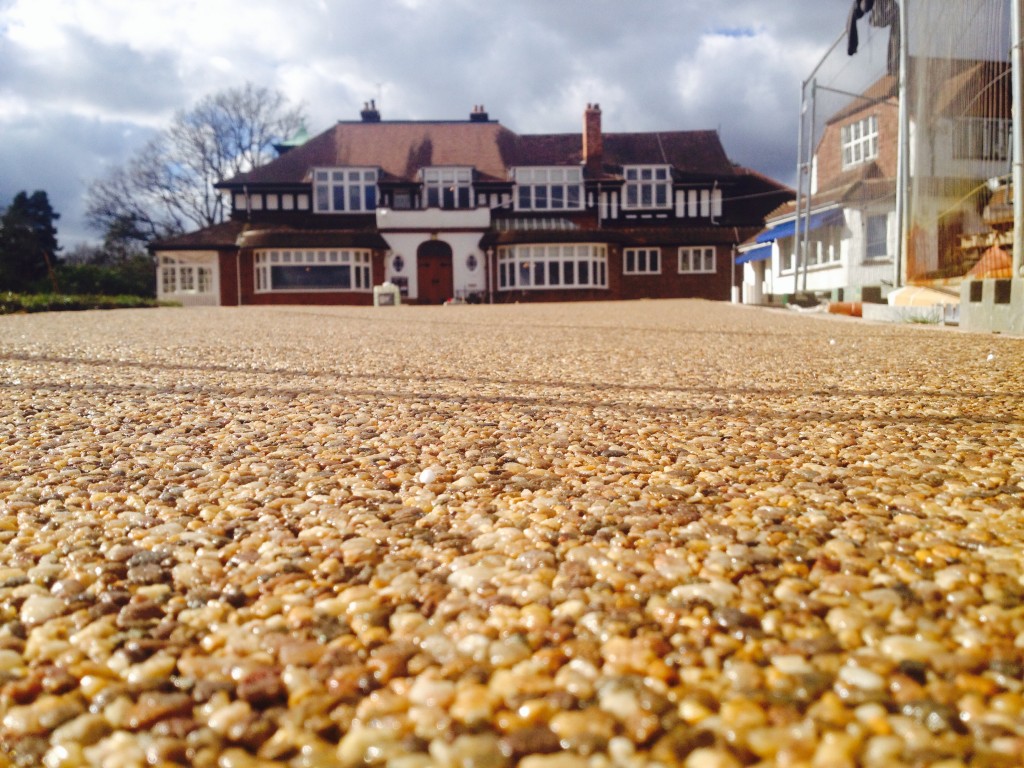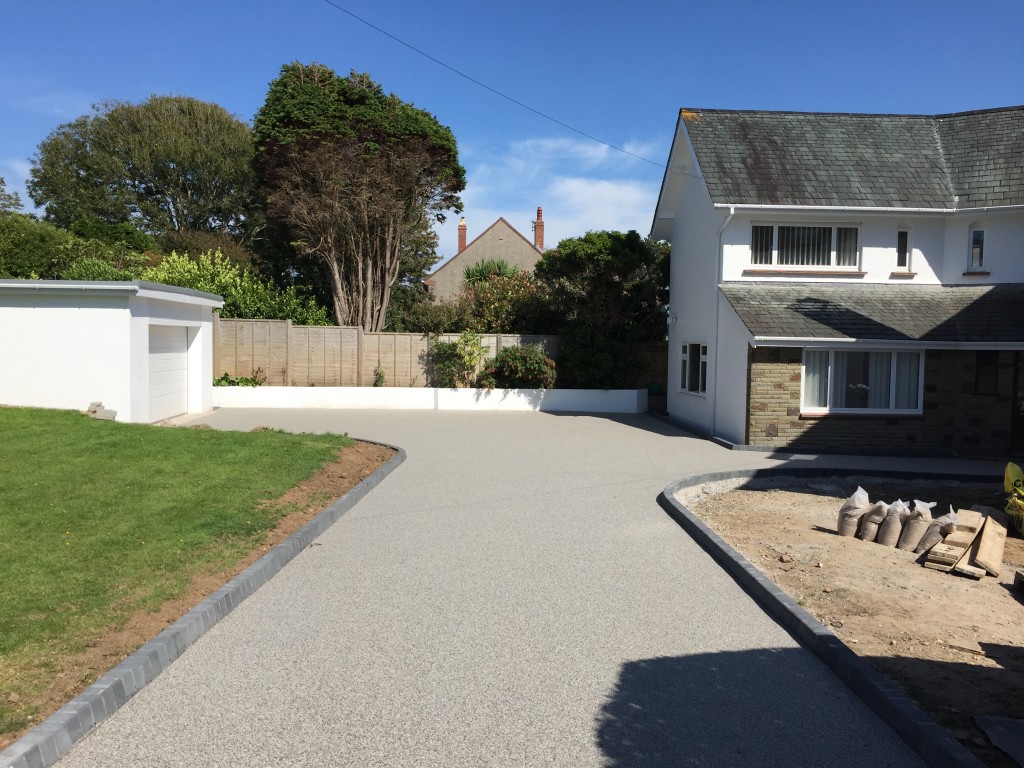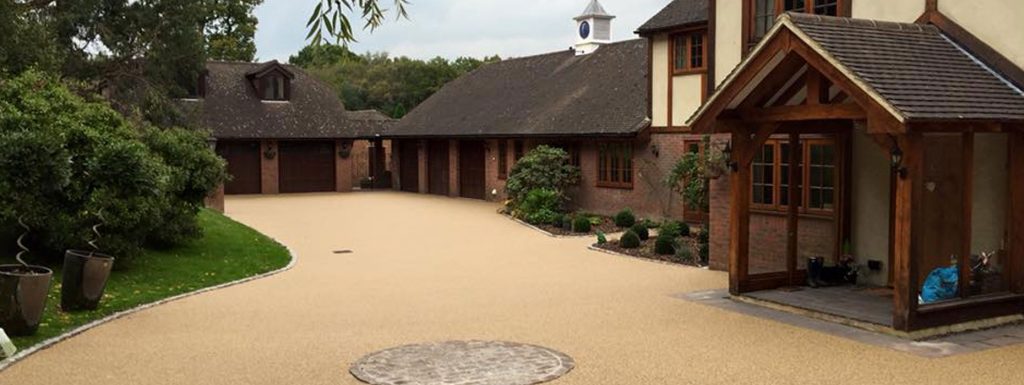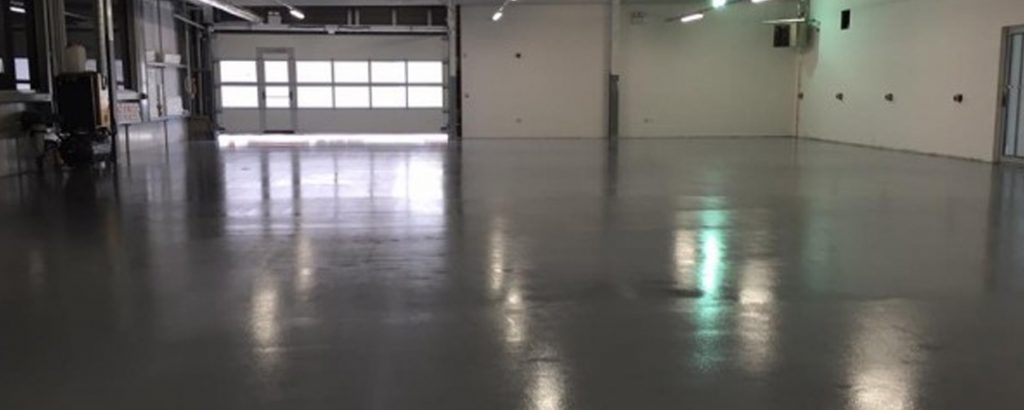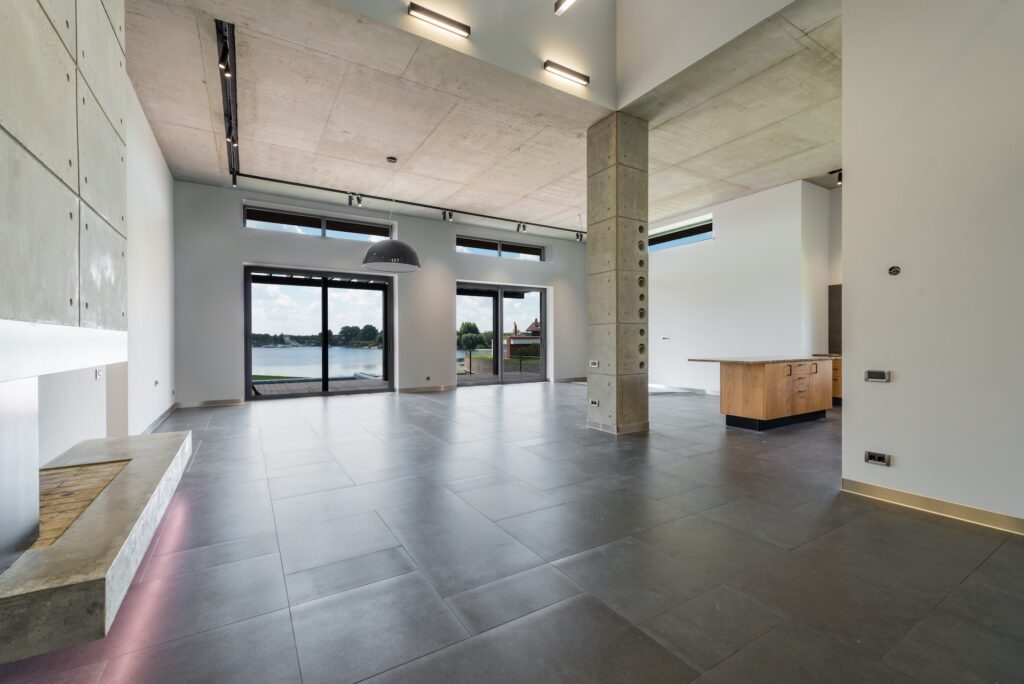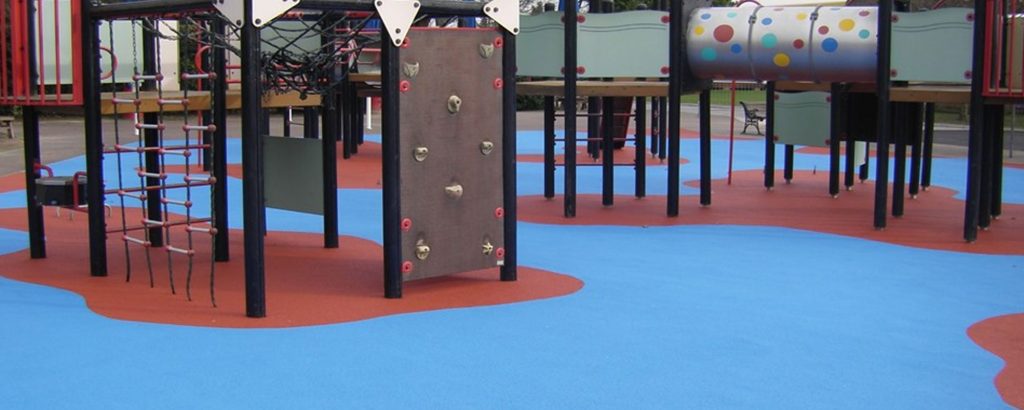Resin bound driveways offer a permeable, durable, smooth and easily maintained, surface that facilitates and helps drain water efficiently. These properties, in addition to its fantastic aesthetic appeal, make resin bound surfacing one of the most popular choices for driveways today. But how much do resin driveways cost?
It’s difficult to quote a cost per square metre for resin driveways as each project has completely unique considerations and specifications. Generally speaking, a resin driveway costs around £50 per square metre upwards depending on the size of the area, existing floor and type of aggregate. Remember that the bigger the area, the lower the cost per m2.
Looking for a free quote?
Fill out our contact form with more details about your resin driveway and we'll get in touch with a more accurate, no-obligation resin drive cost.
So how much does a resin driveway cost exactly? The cost of a resin bound driveway will depend on the answers to several questions including:
- What is the size of the area?
- The size of aggregate and the required depth
- What driveway surface do you currently have?
- Would you prefer a UV stable or Non UV stable resin?
- Do you need to install edging on the site?
- What is the layout of the installation area?
Resin drive cost factors explained
What is the size of the area?
A certain amount of the cost of a resin drive is fixed, regardless of the size, such as fuel costs getting to and from the site. For this reason, cost per m2 rate will reduce as the area increases and conversely, the rate will increase as the area reduces.
What is the size of the aggregate and the depth?
There are a number of differentsize aggregates available on the market. These range from a 1-2mm aggregate, all the way to a 10mm aggregate. The rule of thumb is that the depth must be 3 times the largest aggregate size, so a 2-5mm aggregate would be installed at 15mm, while a 10mm aggregate would have to be installed at 30mm. Driveways are normally installed with a 1-5mm variation in aggregate size, and at a depth of 15mm.
What driveway surface do you currently have?
Another resin driveway cost factor will depend on your existing driveway surface. This is probably the single most important cost driver. We’ll need to take into account the amount of preparation, surface repair, cleaning and levelling required for the sub-base of the drive. You may have a tarmac driveway, a concrete drive, block paving or even a grassed area, all these will take a certain amount of preparation work.
For a grassed or stoned area, the area itself would need to be excavated, and a compacted stone based installed, before installing a porous asphalt. Quite often, this work can be more expensive than the resin bound surface work. See the excavation example below:
Cost of installing resin over the existing overlay
Resin driveway costs can be greatly affected by your existing surface. If you already have a tarmac, or concrete drive/path/patio, the resin and aggregate mixture can be laid over the top, without having to remove the surface.
The existing base must be in good condition prior to overlay. This includes no major cracks, potholes, weeds etc. It’s recommended that you seek the advice of the installer regarding preparation, pre-cleaning, and so on before you go ahead with the installation.
Approximate Costs for a UV stable resin overlay laid at 15mm:
| Area (m2) | Price (per m2) |
| 0-40 | £65 |
| 40-100 | £55 |
| 100+ | £50 |
Cost of installing a resin driveway over block paving
If your driveway is block-paved, you’ll need to speak to your resin drive installer to assess your options. The cost of the resin remains largely the same and depends on the size of the drive, however, your installer will need to assess whether installing over the concrete is viable or if you’ll need to remove the concrete before and prepare a new sub-base. If you have a grassed or stoned area underneath, then before resin bound can be installed, there would be a certain amount of groundwork involved, such as excavation, installing compact stone before laying an asphalt base. All this would need to be done before resin bound could be installed and is most likely to be at least the same cost as the resin itself.
Do you need a UV stable or non UV stable resin?
As you may have guessed, there are two resins available on the market and your choice of which will affect how much a resin drive costs. If you’re looking to save costs, but the Non UV resin is approximately half the price of UV resin, so the metre rate will be much reduced for this resin. Do you want to protect your aggregate from discolouration or are you just looking for something functional and not too concerned about colour change?
If you use a Non UV resin you must expect the surface to yellow over time. Not necessarily a problem if you use a yellow or golden stone, but you will notice it if you leave say a planter on the drive and then move it later, you will see where it has been.
About 95% of Flexflooring’s Stonex installations are with a UV resin.
Do you need to install edging on the site?
You’ll find that if you want to maintain a neat and high-quality finish, you’ll need some form of edge restraint. This can be almost any type of existing edge, such as bricks, paving slabs, timber or a wall. However, if there are no edges, these can be installed. See the edging example below:
What is the layout of the installation area?
Some driveways may have awkward layouts with some areas harder to access to apply a smooth even finish. The layout of the area will need to be inspected to make sure we can deliver an installation of the highest quality.
Is resin bound SUDS (sustainable urban drainage system) compliant?
In the natural world, most surfaces are porous or permeable. That is to say that when rainwater settles on grass, earth, sand etc it will drain through the surface and eventually find it’s way back to the water table.
Similarly, there are man-made surfaces that can or cannot behave in a similar way. One obvious example of a surface that does not behave like this is concrete. Often concrete surfaces will be designed with a fall to a drainage system to take away the surface water. Hence for these type of surfaces, one has to think about the management of that water.
A surface that is SUDS compliant will allow water to permeate through it and back into the water table. If a resin bound driveway (normally installed around 16-18mm) is laid upon a porous surface then the water will permeate through the small pores between the stones and then through the sub-base below and back into the water table.
Of course, if you were to install a resin bound surface on top of a concrete surface, then the water would permeate through the resin bound surface but would not be able to pass through the concrete and would therefore either sit in the surface or drain in the direction of the fall.
Quite often resin bound surfaces are installed upon concrete or old impermeable asphalt, which in turn means the surface is not SUDS compliant. The best construction to ensure the system is SUDS compliant is normally a build up of 150 – 200mm of well compacted non frost susceptible stone, followed by 60-70mm of AC14 open surface asphalt max 100/150 pen and then finally 16 -18mm of resin bound stone. If you own a concrete drive, then to make it SUDS compliant you would need to break the concrete out, dig out the surface and install as outlined. This of course would be expensive as it involves a lot of ground works, which is why many resin bound surfaces are installed on a concrete base or similar, it’s a case of economics.
Do not get resin bound surfaces, which with the right base are SUDS compliant confused with resin bonded surfaces. With a resin bonded surface a resin is spread across a sub base and then the aggregate is scattered into it. That layer of resin will not allow water to pass through it and hence a resin bonded surface can never be SUDS compliant.
This is why it is so difficult to answer the question ‘how much does a resin driveway cost?’ as there are so many contributing factors – but give us a call today and we’ll talk you through your options and cost factors.
Resin driveway costs from an installers perspective – how will your quote be broken down?
If you ask an installer ‘how much are resin driveways,’ he or she should list several cost components when pricing a resin bound surface. Your quote would be made up of the following aspects:
Preparation work costs
The range of costs here can be large. If the client wants to turn a grassed area into a resin-bound surface then there is a lot of work involved. There is the cost of digging the area out, installing a stone base, calling in an asphalt company to install the structural base, installing some edging etc, all before the resin can be even started.
Alternatively, the client may have a concrete drive with cracks and vegetation growing through etc. This all needs to be cleared up, crack repairs carried out and a good installer will probably want to grind the concrete surface to improves its key. So, preparation costs will vary greatly depending upon your existing surface.
The cost of the materials
Your final resin drive cost will be largely determined by the cost of the materials. The components of a resin bound drive are usually, an aggregate stone mix (normally a mix of two different sized stones), polyurethane resin, and sand (and maybe a polymer). If the resin-bound surface is laid on concrete, then an installer may also apply a polyurethane or epoxy primer to the surface first. The aggregate is normally purchased in 25kg bags and has been thoroughly dried to remove moisture. There are a small number of specialist suppliers in the UK that produce this stone. Not all aggregates are the same price and different aggregates will have different properties, such as roughness, slip resistance, angular/rounded etc.
The resin is normally either an aliphatic polyurethane or an aromatic PU. The former is around three times the price of the latter. Aliphatics are UV stable. This means that in bright sunlight the resin will not start to turn a yellowish colour. Aromatics on the other hand will start to turn a golden yellow, which is not what you want if you have, say a grey stone. Be sure to understand which resin is being used, although aromatics are becoming less popular because of this property. Like any product, there are good quality resins and not so good quality resins.
Sand is normally used at around 6.25% of the mix to make the matrix stronger. It has the effect of increasing the surface area of the mix and hence the strength when bound with resin. If you have concerns around how slippery the surface might be, then a fine polymer can be added to the surface to give a grittiness to the surface and improve slip resistance.
Labour costs
Of course, the cost of a resin driveway installation depends on how much labour is required to complete the project. For an average size drive, it is likely that the installer will have 3 or 4 staff. At least one member on the mixer, ensuring the ratio of aggregate to stone is correct, probably one labourer taking the mix by wheelbarrow to the one or two men who will be trowelling the mixdown. The number of men or women trowelling will probably depend on the shape and size of the drive, as what the installers need to do is keep the edge wet or you will end up with lines through the surface. Some installers might also use a hover trowel to finish the surface. Labour rates can vary from around £100 to £200 per day depending on skill levels etc.
Other costs that will influence your resin driveway price
Other costs the installation company need to factor in are mileage of the vans, delivery of the materials to site, provision and installation of edging to finish against, overnight accommodation and subsistence costs for staff if traveling far and hiring of some plant if not owned by the company, disposal of waste (i.e. if a dig out is required).
As should be evident there are many resin drive cost factors that have to be considered. Some of these costs are fixed, regardless of the size of the area and some are related to area (like materials), which is why per square metre rates are influenced by area size.
Interested in investing in a quality resin Drive? You can find out the cost resin driveways by getting in touch with us for a no obligation quote. Give us a call on: 01622 747909 Or send us an enquiry online.
Check out an installation video below:
Resin driveway cost FAQs
We appreciate that there are many questions to be asked before choosing a resin driveway. Here are some of the top questions asked relating to resin driveways and we hope this can help you decide on whether to install a resin driveway in your home or commercial premises. The main questions relating to resin driveways are as follows:
How durable is a resin drive? Will it last?
A resin driveway is very durable and it will last and retain its appearance for many years so you’ll need to factor this into the cost of a resin driveway and work out how much you’ll save in the long run. This is because the surface is bound with resin on top of the pre-existing tarmac or concrete which seals any gaps that could give rise to weeds and other debris under the surface. Although you may find that small airborne seedling can take root, they are easily removed or killed off with the right treatment.
Resin bound surfaces are made up of a combination of natural or coloured aggregates, and polyurethane resin (not epoxy). A good polyurethane will allow for some flexural movement in the surface (freeze and thaw effects) and is hence resistant to cracking. However, it must be said that resin bound surfaces are not completely crack resistant (quite often claimed). The surface relies on its structural sub-base and if you do observe any cracking, it is highly likely that this is due to some form of ground movement in the sub-base, hence the importance of good surface preparation and the absence of any ground movement. If your surface starts to crumb, that is stones easily break away from the surface and sometimes the surface becomes chewy, it is highly likely that the resin is the problem. There are many different resins on the market, not all of the same quality.
As explained previously, our resin driveways are also resistant to UV light. There are two types of resin, an aliphatic resin and aromatic resin. Aliphatics are more expensive but are resistant to UV light and so will not discolour rapidly. Your installer may use an aromatic resin, which is cheaper. If the installer used an aromatic resin, then over time the surface will start to yellow and if you were to place, say a plant pot, on the surface and left it a couple of weeks in the sun, when you move it, you would see a distinct colour difference.. With regular maintenance, your resin driveway will last for many years which makes it a great choice for homeowners. If kept exceptionally well, they can last beyond 25 years. At Flexflooring, we warranty our surfaces against faulty material and/or workmanship for two years. If there is any kind of problem which is down to the quality of the installation it is very likely to appear within 12 months, if not sooner.
Buyer beware: There are some companies that guarantee a crack-free surface for 10 years or more. Make sure you read any small print, because no installer can guarantee that a stray tree root or ground movement will not cause any fracturing of the surface and they are extremely unlikely to reinstall a surface if the fracture occurs for this reason. Watch out for a lower than usual resin driveway cost from these installers as you’ll get what you pay for!
What makes resin such a good choice?
Resin bound is incredibly versatile and ticks a number of boxes when assessing a new driveway. It has non-slip qualities, which can be enhanced by adding polymers or crushed glass to the mix which means that during wetter months, it will not cause any unsteadiness underfoot. It is durable and long-lasting as well as holding its style and texture. Resin bound driveways are a lot easier to maintain than most materials.
Although a resin bound driveway costs a little more than other options, the biggest reason why homeowners opt for resin bound is for the aesthetic appeal. A resin driveway can really modernise a tired-looking drive. There’s plenty of room to be creative and we can help you choose which stone, natural or coloured is best for you.
Can I install a resin driveway on top of block paving?
As discussed previously, we are able to install a resin driveway on top of most structural sub-bases (not grass) e for the majority of homes. It is best to prepare the block paving beforehand to ensure that there are no cracking or damages that may occur over time. Therefore, we would often try to consolidate and strengthen any paving before laying the resin bound It can be used as a base but we would ensure it was prepared beforehand. The minor preparatory work does not take long at all which will reduce your resin driveway installation cost. It is much easier to lay resin bound because it does not need large amounts of excavation and invasive work that takes time and effort. However, we would need to inspect the surface, as we would not wish to install over block paving if we thought there was a good chance of the sub base moving or shifting over time.
Can I install a resin drive on top of tarmac?
The best sub base for a resin driveway is in fact a porous tarmac. If constructing from scratch this would be the sub-base of choice. A resin bound driveway installed over porous macadam installed upon a compacted stone base is ideal. This type of surface qualifies as SUDS (sustainable urban drainage system) as water does not need a drain away and should permeate back through the surface into the water table. However, there are still a lot of old tarmac drives, which as long as they are structurally sound, can be installed upon. These old tarmac surfaces or concrete surfaces are not porous, so one may need to consider drainage depending upon the layout of the driveway. We would always recommend that this type of surface is primed with a resin first to aid adherence.
How long does it take for a resin driveway to set?
Although the setting process does not take long, we would advise 48 hours for the resin to set before vehicles use the driveway and 72 hours for larger vehicles. Overnight would be ideal for those who are needing to walk on the service and the very minimum amount of time is 8 hours to ensure that it is set and bound well. It is not disruptive and once set, it will endure years and years of walking and driving.
How do you maintain a resin driveway?
It is relatively easy to keep on top of your resin driveway maintenance as mostly the resin will look after itself. It will require a pressure wash every now and again to lift any surface dirt which will ensure it stays debris-free but other than this, it is often very manageable. A jet wash is preferable and it is really the best way to clean it. If you do not have access to a jet wash then a strong garden hose can also work.
In the winter, many customers ask whether they can apply rock salt or grit to the surface to prevent snow build up. The answer is yes. The drive would not react negatively to the salt so this is a safe practice.
Other ways to keep your resin driveway in great condition:
- Try not dry steer your vehicle when parked on the drive. This generally results in tyre marks which can be removed, however, it’s best they’re avoided completely. Also, beware if you have turning circles as you might want to consider installing at a deeper than standard depth.
- Do not drop large, heavy items on to the drive. Whilst the drive is built to support cars and heavy vehicles, skips and other heavy objects with sharp edges can scrape the surface. i.e. don’t drag anything heavy across the surface, like a skip.
- Avoid the spillages of oil products, cement, plaster and petrol products. These can be cleaned off, however, they will stain if left unattended for a period of time
Summary – The advantages of a resin driveway
To summarise, here are some of the biggest benefits of a resin driveway that you can look forward to:
- High durability – it is very durable, will wear well and it can be laid over existing tarmac or concrete. It can last up to 25 years.
- Porous – it will allow water to seep back into the water table if constructed on a porous macadam.
- Versatility – it comes in many different styles and colours according to your preference. If you want a mix and match this is also achievable.
- Attractive appearance – it looks good. It is smooth, attractive and adds value to your property. It looks stunning and promotes an expensive and luxury feel.
- Low maintenance – it does not take much to take care of the driveway, other than power washing to ensure that the resin stays clean.
- Quick installation – it causes minimal disruption and fuss and can be done relatively quickly to ensure that you can continue life as normal as possible.
- Better traction for cars and pedestrians – it is better for those who suffer with any type of mobility issue, it will ensure that you can walk steadier on it and is wheelchair friendly.
- 10 x more eco-friendly than concrete – in our changing world, it’s important to know that we are choosing the best options for our planet.
- UV resistant – it will not be damaged or compromised by UV light, making it a great choice during summer (if using the correct resin).
- Resin driveways do not require planning permission.
Time for an upgrade?
Have we answered all your burning questions? We hope so. Before your resin driveway is laid, we will first assess the area, looking at the shape and materials of the area which will give us a better idea of what needs to be done and a more accurate resin driveway cost. Generally speaking, if your driveway or space already has tarmac or concrete laid, then the resin will be able to be laid directly on top, with some minor preparatory work. The look can truly transform your home, and if you are currently thinking of selling, then undoubtedly will it add value to your home as well as looking incredibly attractive to buyers. Resin bound will ensure there are no weeds growing up in between stones, as so frequently seen on regular driveways; which means less time on digging them out and less money on using products to keep weeds at bay, as well as the resin bound finish looking impeccable.
If you feel that you would like to upgrade our home for the better and choose a resin driveway, please do feel free to get in touch with us today to understand your options and speak to one of our friendly team members about what will work best for you and your space.
Get in touch for a more accurate resin drive cost!
Looking for a quote? Fill out the form below and we’ll get in touch with a no obligation quote.
